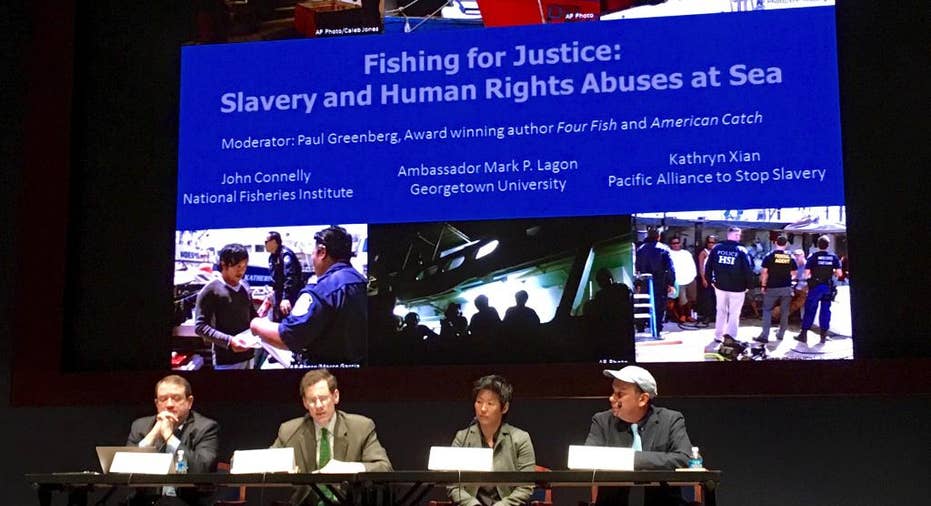Forum: Congress must help Hawaii fishermen confined to boats

WASHINGTON – Congress should act immediately to improve slave-like conditions for hundreds of foreign fishermen working in Hawaii's commercial fleet, speakers at a congressional forum said Tuesday.
"These fishermen are treated like disposable people," said Mark Lagon, a scholar at Georgetown University's Walsh School of Foreign Service, who told the forum the fishermen live like modern-day slaves. Crew members earn less than $1 per hour, and total costs for crews of nine or 10 men are less than the cost of ice to keep the fish fresh, Lagon said.
"Slavery is not just some abstract concept," said Lagon, the former director of a State Department office to monitor and combat human trafficking.
Slavery "is something that touches our lives. It goes into our stores, and it goes into our mouths," Lagon said.
Lagon was one of several speakers at a forum Tuesday on slavery and human rights abuses at sea. The forum, sponsored by Democrats on the House Natural Resources Committee, followed an Associated Press investigation that found fishermen have been confined to vessels for years without basic labor protections.
The AP report found that commercial fishing boats in Honolulu employ hundreds of men from impoverished Southeast Asia and Pacific Island nations who catch swordfish, ahi tuna and other seafood sold at markets and restaurants nationwide. A legal loophole allows the men to work on American-owned, U.S-flagged boats without visas as long as they don't set foot on shore.
Fishing "is used as a tool for slavery," said Kathryn Xian, executive director of the Pacific Alliance to Stop Slavery, a Honolulu-based advocacy group.
Xian and other speakers at the forum urged Congress to close the loophole that allows workers to stay on the boats without coming ashore.
"There needs to be vetting of these workers as they enter U.S. waters," Xian said, adding that Congress and states such as Hawaii also need to do more to regulate the fishing industry. "We can't allow industry to self-regulate," she said.
John Connelly, president of the National Fisheries Institute, a nonprofit organization that represents the seafood industry, said the fishing industry already is heavily regulated. The overwhelming majority of fishing boats follow the law and do not exploit workers, Connelly said, calling the Hawaii situation an anomaly.
All fishing is difficult, Connelly said, calling it "hard, dangerous work" even under the best conditions. Connelly and others said brokers who supply fishing boats with vulnerable workers should be targeted by authorities.
Most of the approximately 700 crewmembers in the Hawaii fleet are from the Philippines, Indonesia, Vietnam and the tiny Pacific island nation of Kiribati. Because they have no visas, they aren't allowed to fly into the country, and are instead picked up at foreign ports and brought to Honolulu by boat.
The AP report found that while many men appreciate the jobs, which pay better than they could get back home, some fishermen work as many 22 hours a day, are forced to defecate in buckets and suffer running sores from bed bugs.
Hawaii's congressional delegation has said they are exploring legislative solutions after being startled by the findings about the state's $110 million industry, which ranks fifth among the country's highest-grossing fisheries.
"It is completely unacceptable that the inhumane treatment of any workers, foreign or not, is legal under U.S. federal law," Sen. Mazie Hirono, D-Hawaii, said in a statement.
___
Follow Matthew Daly: http://twitter.com/MatthewDalyWDC
___
Read AP's Pulitzer Prize-winning Seafood from Slaves series: http://www.ap.org/explore/seafood-from-slaves/



















